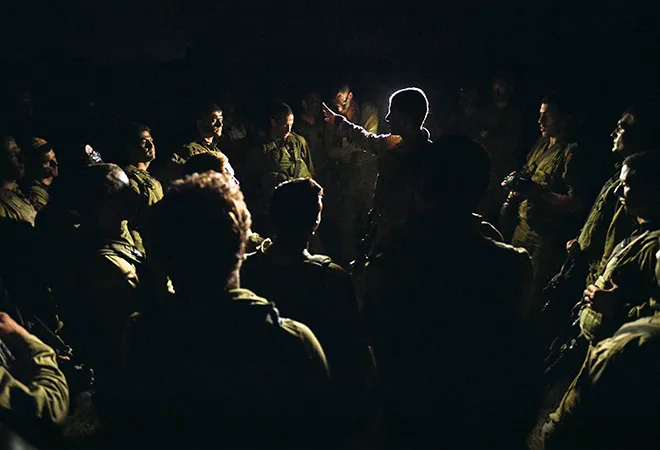
Last week, India abstained from the United Nations vote on the US resolution condemning Hamas for firing rockets into Israel and inciting violence. In the preceding vote on whether the final resolution about the condemnation should be adopted by a simple or a two-third majority, India had supported the US on keeping the bar for voting lower.
The US lost the vote not because of the predictable position of the Arab countries on Hamas but because of its allies, including India, who either abstained or voted against the US in both the procedural vote and the final vote. In the end, Washington failed to get a two-third majority by 28 votes. So India’s support, or lack thereof, would not have changed the net outcome either way. But abstention, in this case, did not translate into India’s agnosticism on the vote. On the contrary, India’s position turned out to be a vote against the US.
India’s support, or lack thereof, would not have changed the net outcome either way. But abstention, in this case, did not translate into India’s agnosticism on the vote.
India’s vote against the US would have been understandable had it sought to condemn the Palestinian cause — the legitimate right of Palestinians to have their own state and withdrawal of Israeli settlements from its territories. But that is not what the US ambassador to the United Nations, Nikki Haley’s resolution was about.
By abstaining from the UN vote on condemning Hamas’ terrorism, the Modi government has sent a wrong message that India is tolerant towards terror in the world as long as it is not directly affected by it. The vote also implied that India does not mind the violence Hamas perpetrates against its strategic partner, Israel.
In the post-9/11 world, the least countries like India, which continue to be at the receiving end of terrorism, can do is take an unequivocal stand against terror as a state policy. India cannot have double standards on Hamas and Hizbul Mujahideen when in principle it believes that both are terrorist organisations.
Hamas does not attack Israeli defence forces alone but it has repeatedly put its own civilians in the line of fire and even justified the use of human shields. It strategically launches thousands of rockets, often from populated areas into Israel, only to provoke retaliation and endangering the lives of its own people. Hamas is also known to prevent its civilians, including women, small children and aged Palestinians from evacuating the battle zones.
Hamas does not attack Israeli defence forces alone but it has repeatedly put its own civilians in the line of fire and even justified the use of human shields. It strategically launches thousands of rockets, often from populated areas into Israel, only to provoke retaliation and endangering the lives of its own people.
This self-destructive approach keeps the conflict intact and does not bring the stakeholders to the negotiating table in the West Asia.
Besides, Hamas in the last decade has squandered every opportunity to improve infrastructure, trade, economy and education. Instead, it invested its resources in building an extensive network of tunnels to stock rockets and weapons brought in from Iran and Syria to attack Israel.
In this context, the 28 countries which ensured the US defeat at the UN emboldened Hamas, which immediately flaunted its victory as a “slap” to the Trump administration. With such duplicitous stand, India cannot now take a higher moral ground against China which has repeatedly vetoed its attempts to blacklist the chief of Kashmir’s indigenous terror organisation Hizbul Mujahideen, Syed Salahuddin. What is the locus standi of India when Pakistan calls the Hizbul commander who wanted to establish Caliphate in Kashmir, Burhan Wani, a freedom fighter and a martyr in the United Nations? India’s position is also akin to the distinction Pakistan makes between good Taliban, the one it uses against Afghanistan and bad Taliban, the one that it has been fighting against.
What is the locus standi of India when Pakistan calls the Hizbul commander who wanted to establish Caliphate in Kashmir, Burhan Wani, a freedom fighter and a martyr in the United Nations?
The BJP government may argue that the contradictory vote at the UN on Hamas was in view of India’s need to balance its relationship with Saudi Arabia and other OPEC countries for the sake of keeping oil prices stable and reasonable. In fact, Saudi Arabia acknowledged that the decision at the OPEC meet take Prime Minister Narendra Modi’s suggestions seriously.
However, it is short-sightedness because geopolitical reality of the world has changed since the Shale revolution and fuel efficiency mechanisms cut down the oil demand in the developed world. The fact is that the OPEC does not remain the most important player in determining oil prices in the international market anymore. After Qatar quit the OPEC this month, even Saudi Arabia’s ability to cut down the oil production and keep the prices artificially higher is limited.
Therefore, India does not gain much from balancing acts in the changing geopolitical scenario. Even if arithmetically it was inevitable that the US would lose the vote on Hamas, India had all the more reason to stand by its strategic allies, Israel and the US. The Modi government may congratulate itself over the “fine balance” it struck over the issue by first backing the US and later helping the Hamas, but this diplomacy of running with the hare and hunting with the hounds on terrorism is detrimental to India’s interests.
The views expressed above belong to the author(s). ORF research and analyses now available on Telegram! Click here to access our curated content — blogs, longforms and interviews.




 PREV
PREV


